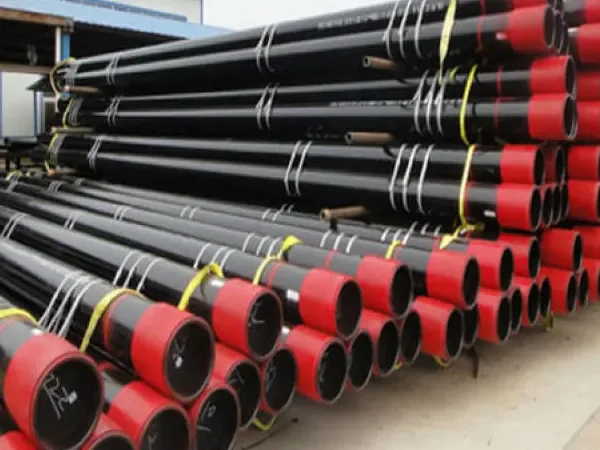Characteristics of sizing of high frequency straight seam welded pipe
ERW steel pipe sizing refers to the use of special pass rolls to roll welded pipes to adjust round or special-shaped pipes with irregular sizes and shapes to finished pipes with regular shapes and sizes that meet the requirements of the standard. The welded pipe sizing The process has six characteristics: fasting rolling, micro-tension rolling, active rolling and passive rolling, the larger rolling force and the larger linear velocity are not at the same point, the small pass adopts the large pipe and the small diameter reducing rolling.

1. Micro-reducing rolling, whether it is round-to-round sizing rolling, or round-variation, different-to-different shaping rolling, the reduction rate is generally very small. For welded pipes with an outer diameter of φ15~200mm, The total diameter reduction usually only accounts for 1.2%~0.65% of the outer diameter D of the finished pipe. This feature has guiding significance for the sizing roll pass design, sizing allowance setting and actual operation, and provides for the formulation of sizing process parameters The basis.
2. Fasting rolling, welded pipe sizing belongs to the category of open-web cold rolling, which is to roll the open web welded pipe with a sizing roll. As long as a small rolling force is applied, the shape and size of the welded pipe can be changed. In this process , The circumferential direction of the welded pipe becomes shorter, the section becomes thicker, and the longitudinal becomes longer. This feature requires that the rolling force applied by the sizing pass should not be too large, otherwise the section size of the welded pipe will suddenly shrink, the shape will be deformed, and the process goal cannot be achieved. .
3. Micro-tension rolling, the whole process of welded pipe rolling is inseparable from the longitudinal tension. The longitudinal tension of the sizing section is closely related to the forming section and the welding section. After the specifications and varieties of the welded pipe are determined, the main factor affecting the sizing tension is the fixed diameter. The linear speed and rolling force of the pass of the flat-diameter roll, and the characteristics of micro-reduction and billet rolling during the sizing process of the welded pipe determine that the rolling force applied by the sizing roll to the welded pipe cannot be very large, and the resulting frictional force It cannot be compared with the solid billet rolling. This feature requires that the linear speed of the sizing flat roll needs to be slightly faster than the linear speed of the forming flat roll to obtain the greater friction required for the sizing process.
4. Active rolling and passive rolling coexist. In addition to reducing the diameter deformation, another important function of the sizing flat roll is to provide driving force for the operation of the welded pipe, and the force exerted by the sizing vertical roll hinders the operation of the welded pipe. One feature requires us to not only care about the size adjustment when adjusting the sizing flat and vertical rolls, but also consider the adjustment of the rolling force of the flat roll and the vertical roll to ensure that the rolling force of the flat roll is greater than the rolling force of the vertical roll. This is the basic principle that needs to be followed when adjusting the sizing flat and vertical rolls.
5. The larger rolling force of the sizing flat roll pass is contrary to the larger linear speed. Taking the sizing round pass as an example, in the normal production process, attention should be paid to prevent the size of the round pipe from being higher than the upper and lower and horizontal directions.
6. The small hole type accepts the large welded pipe. According to the sizing process and principle, the geometric size of the welded pipe before entering the next sizing roll pass is always larger than the pass. In fact, in order to prevent the welded pipe from entering the pass, it is compared with the pass. Friction occurs at high linear speeds A and B, and the size of the corresponding welded pipe is always adjusted to be slightly smaller than the hole size. This contradiction between the theoretical design of the round hole and the actual adjustment of the welded pipe to an ellipse directly leads to two bad Consequences: One is to increase the friction between the edge of the hole and the welded pipe, and accelerate the wear of the edge of the hole; the other is that the parts on the surface of the welded pipe corresponding to the edge of the hole are vulnerable to extrusion damage, although this wear and extrusion Sometimes it is slight, but it can be avoided. This inspires people to improve the design ideas of the existing round (including some special-shaped pipes) pass, so that the theory is close to reality, so as to prevent the adverse effect of the pass on the welded pipe and the pass itself. The unfavorable influence of the roll pass lengthens the use time of the roll pass.






